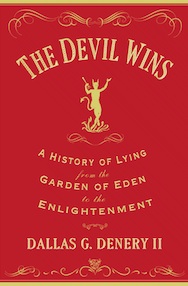Lewis Fried
Asking whether it is ever acceptable to lie, The Devil Wins offers the reader a fascinating historical account of apodictic as well as iconoclastic answers. The question and its responses implicate yet others: how do we know the truth God offers; are God’s word and promise unchanging or situational; what if we cannot perceive or grasp such certainty; may humans lie; how large is the gap separating truth from falsehood?
Christian Scripture announces that the Devil is the father of lies, and from there, Dallas G. Dennery II authoritatively explains a phenomenon that marked an early Christian world-view that provided an essential theodicy, as well as an understanding of Christ’s life, and the struggle to live in a damaged world. For Church thinkers in general, God had sent His only begotten Son to redeem humankind from both the event and consequences of the “Fall,” a result of the serpent’s seductive argument that Eve could, without punishment, eat the fruit from the Tree of the Knowledge of Good and Evil. For Enlightenment philosophes propounding secular, rational explanations, supernatural, religious fables were banished from an account of human nature and history.
The architecture of The Devil Wins indicates the method of study: five “separate” investigations. And, an abbreviated list of the book’s considered authors and topics, in random order, presents the inquiry’s sweep: the writers of Genesis, the authors of the Gospels, Augustine, John of Salisbury, Descartes, Christine de Pisan, Kant, Castiglione, Aristotle, Luther, and the nature of deception and uncertainty. Dennery’s refusal to bleach away the many and diverse answers to “Is it ever acceptable to lie?” accounts for much of the book’s power. To be sure, the question was not variable, but the answers were various. The history of the responses is not reducible to a straight line but is best expressed as a colloquy.
The early chapters, the foundations on which the study rests, center on Christian theologians’ various readings of Genesis’ portrait of the Devil, that figure manifest as the cozening serpent who undid the work of the Divine and the harmony of Creation. Arriving at the right interpretation, it was argued, illuminated God’s word—the divinely ordained truth.
However, there was—and is— no easily unassailable conclusion. For the second chapter asks if God can deceive? How could the God of the Bible, “a God who speaks, punishes, deceives, lies and orders others to lie for him” be reconciled with the perfect God whose very nature admits of no defects? Theological discussions about lying are followed by chapters exploring both permissible and unredeemable deception expressed by people ranging from courtiers to members of ecclesiastical orders and secular courts; from men who accepted women as daughters of Eve to women writers challenging the claim that females were of lesser nature. The figures in the Garden cast a pronounced shadow.
Dennery identifies a salient landmark in the transition of answers from the theological to the secular: Rousseau’s Discourses. Mendacity becomes a “natural problem” requiring “natural solutions.” Almost consumed by a yearning for humanity’s “perfection” in an earlier existence, Rousseau’s account of our entrance into modern history devolves upon human corruption and social pretense. Institutions, mores, and manners come to disguise our authentic selves, to make us “put on a face” to meet yet other composed individuals. As Dennery points out, Rousseau is not of the company of “austere moralists” but accepts our limitations. “We are sincere when we act and speak according to our inner sentiments and nature, even if those inner sentiments cannot live up to the ideals we hold.”
We perceive the world with a new lens. The problem of lying is now sundered from “God and the Devil.” Our situation is changed, “as if, having lived too long in exile, we one day realized paradise had never existed in the first place.” These last, poignant lines are a graceful tour de force, and fittingly conclude this masterful reflection. An appropriate, paraphrased line from a modern writer will serve well: we are lost out here in the stars, alone.
Lewis Fried (ΦBK, Queen’s College, CUNY, 1964) is Professor of English Emeritus at Kent State University and a resident member of the Nu of Ohio chapter of Phi Beta Kappa.




